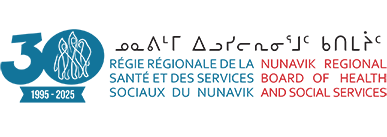Job Offers
To find out about available positions at NRBHSS:
Find out about nursing and social work jobs by visiting the websites of the 2 health centers:
- Ungava Tulattavik Health Center: https://www.tulattavik.com/en/be-part-of-the-team
- Inuulitsivik Health Center: https://www.inuulitsivik.ca/careers/?lang=en
Professional integration
Working in the North puts you in contact with people whose personality traits are very recognizable: opening-mindedness, adventurousness, non-conformity. You will create strong bonds through social and professional activities. The arrival of a health care worker in Nunavik creates a special kind of exchange. On the one hand, your skills will provide a valuable service. On the other hand, you will be opening yourself up to a different and unique culture, supporting the efforts of Inuit people to take responsibility and helping them to identify problems and find solutions. Health care workers should always be looking for ways to participate and use their expertise to help develop the local skills pool.
View brochure Finding work in the Nunavik Health and Social Services Network
Today, Inuit occupy nearly half of public service jobs. In the field of health and social services, Inuit people are administrators, program managers, nurses, dental assistants, officials in northern settlements and community workers. Despite the significant involvement of the Inuit in the management of their health care system, Nunavik still relies on skilled labour from outside the region.
Salary conditions
Health and social services jobs in Nunavik are remunerated based on the same pay scales as elsewhere in the Quebec network, taking job title, training and relevant experience into account.
- Regional disparity benefits
- The isolation premium and cost of living allowance varies based on the community in which you work. The farther North you go, the higher the premiums get;
- A retention bonus is paid to all employees (except for certain job titles), and the amount varies based on your length of service in Nunavik;
- An installation / retention premium is paid only to physicians and pharmacists.
- Other employment benefits : All new employees recruited in Quebec over 50 km from their place of work in Nunavik are reimbursed for the following:
- Travel and living expenses from their home to their place of work in Nunavik for themselves and each of member of their family at the time of hiring;
- Transportation costs of personal belongings, and, if necessary, the belongings of family members from their home to the work location;
- Storage fees for all furniture and personal belongings requiring storage in the South;
- Transportation costs for a motor vehicle such as car or truck, or for two recreational vehicles such as an ATV or snowmobile during the first two years of employment.
- Employees will also receive the following :
- Furnished, heated and lighted housing that meets their family’s needs, with some establishments charging minimal rent;
- The reimbursement of travel and living expenses (four times a year for a person without dependents or three times a year for an employee and their dependents)
from the village where they are working to their place of recruitment in the South; - Payment for days in transit at departure and arrival for each of these trips;
- Employees working in Quebec’s health and social services network can apply for leave without northern pay. This leave may be authorized for a maximum period of four years.
Living up North
In the North, life is so much more than work. In addition to a new job, you will have to adapt to a new climate and a different way of life. it is important to take time to understand and respect the inuit culture, to get involved and to always have an open mind.The discovery of a new culture and intensity of social relations offsets the small size of local populations. Mutual support and the development of good relationships are the best ways to integrate into everyday life and work.
All of the communities share similarities. Services vary based on population: general store, community centre, gym, childcare centre, school, CLSC, police, roads and garbage collection.
A typical sight on the roads are the municipal trucks that supply drinking water and collect wastewater. Hydro-Québec supplies electricity using oil generators. A wide range of outdoor recreation activities are available year round. In addition to world-renowned traditional activities like hunting and fishing, there is hiking, snowshoeing, cross-country skiing, mountain biking and snowmobiling. Lively celebrations mark the seasons, such as berry picking festivals, sled dog and snowmobile races and the amazing Puvirnituq Snow Festival.
